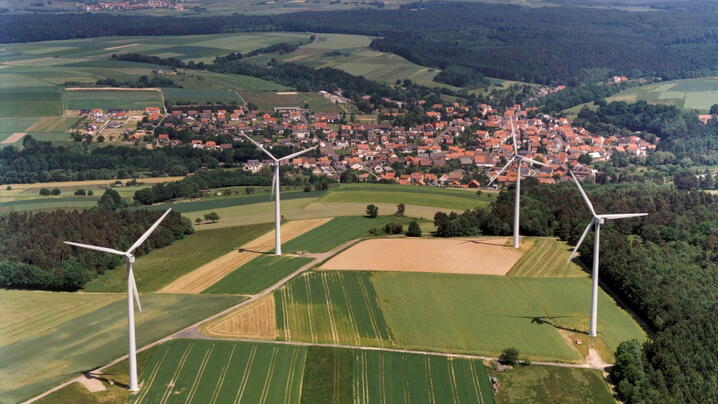
In June 2013, I joined ICMA for a summer internship to work with the CityLinks Team on the project’s three focus areas: water and sanitation, food security, and climate change. As a Fulbright Scholar from Germany, I am currently pursuing a master’s degree in public administration with a focus on local government and public finance at American University in Washington, D.C. While I am gaining a U.S. perspective on city and county management and international development in my school and internship, I wanted to share with you what is presently happening at home regarding domestic and international climate change efforts of German municipalities. I was born and raised in Mücke, less than a two hour train ride away from Frankfurt am Main, located on the border of a rural hilly region, called Vogelsbergkreis, in the heart of Germany. The Vogelsbergkreis supplies the city of Frankfurt with fresh water and is known for the heavy expansion of wind energy in recent years as a new and renewable source of energy.
This blog post provides insight into (i) a coaching initiative that assists German municipalities drafting individual climate change strategies and (ii) an international municipal partnership initiative between cities in Germany and in developing countries that focuses on climate change mitigation and adaptation.
(i) Climate Change Coaching in the Light of Financial Constraints.* German municipalities have joined forces under the umbrella of a Climate Alliance and committed themselves to reduce CO2 emissions by 10% each year, half the per person emissions by 2030 (baseline 1990), and abandon the use of tropical woods. Going hand in hand with the approach that cities learn best from each other, the initiative started out with a pilot project involving five municipalities from different regions that would then serve as benchmarks for additional cities. The pilot cities participated in a coaching phase during which climate change experts helped the local leaders develop climate change strategies tailored to their needs. The lessons learned and results of these pilot projects were then made available online to all other municipalities in Germany. This online resource pool so far contains tools for CO2 monitoring, climate cities benchmarks and guidelines on developing climate change policies. While a considerable amount of German local governments is facing high levels of municipal debt, this initiative meets those budgetary restrictions by providing small to medium sized and financially constrained municipalities with an inexpensive way to address climate change. In addition to the web content individual consultations are offered to the municipalities, funding possibilities are provided and local governments are guided in establishing regional networks to encourage further city-to-city learning and exchanges.
* To learn more about the problem of municipal debt in Germany see The Economist, Germany’s Local Finances: Hundreds of mini-Greeces
(ii) International Municipal Climate Partnerships. While the climate change coaching is a domestic city-to-city learning process, the approach to link cities worldwide to address climate change can be found not only with ICMA’s CityLinks program but also within Germany’s development assistance. Since 2010, municipalities from different regions of the country are entering into partnerships with municipalities in developing countries under the “50 Municipal Climate Change Partnerships by 2015” project. It is an initiative that acknowledges the indispensable role of local governments within Global Climate Change efforts. While some of the bilateral climate change partnerships build on long standing sister city relationships, others just formed recently. The nine pilot partnerships of German cities and one region with municipalities in Ghana, South Africa, and Tanzania address climate change mitigation and adaptation. The project aims to create 50 municipal climate partnerships by 2015 and the first pilot partnerships are currently bearing fruit. In Tanzania, partnerships have resulted in the planning of fermentation and photovoltaic plants and in the Ghanaian city of Cape Coast, a project for the restoration of the Fosu Lagoon will be implemented as a climate adaptation measure. While these technical assistance examples build on German expertise in these areas, each German city has to explicitly formulate its own climate mitigation and adaptation efforts as part of the partnership. This two-way approach to the flow of expertise and commitment to climate change mitigation efforts accounts for the actions that cities in industrial nations need to take to mitigate climate change in their position as the major air pollution emitter.

Source: ServiceEineWelt, https://www.facebook.com/servicestelle.kommunen.in.der.einen.welt
While climate change targets are negotiated on international levels, the solutions to reach these goals often demand decentralized approaches, and international development city partnerships are directly addressing this need. Taking a look at Germany’s efforts regarding municipal climate change strategies at home and around the globe have resulted in interesting insights for me and the CityLinks team, and I hope this blog entry will do the same for our readers.
To learn more about CityLinks, visit our website, follow us on Twitter at @ICMACityLinks, and join our climate change discussion in the Climate Preparedness, Adaptation, and Resilience group on the Knowledge Network. Please visit ICMA International’s site for additional information ICMA’s other global projects.
New, Reduced Membership Dues
A new, reduced dues rate is available for CAOs/ACAOs, along with additional discounts for those in smaller communities, has been implemented. Learn more and be sure to join or renew today!
